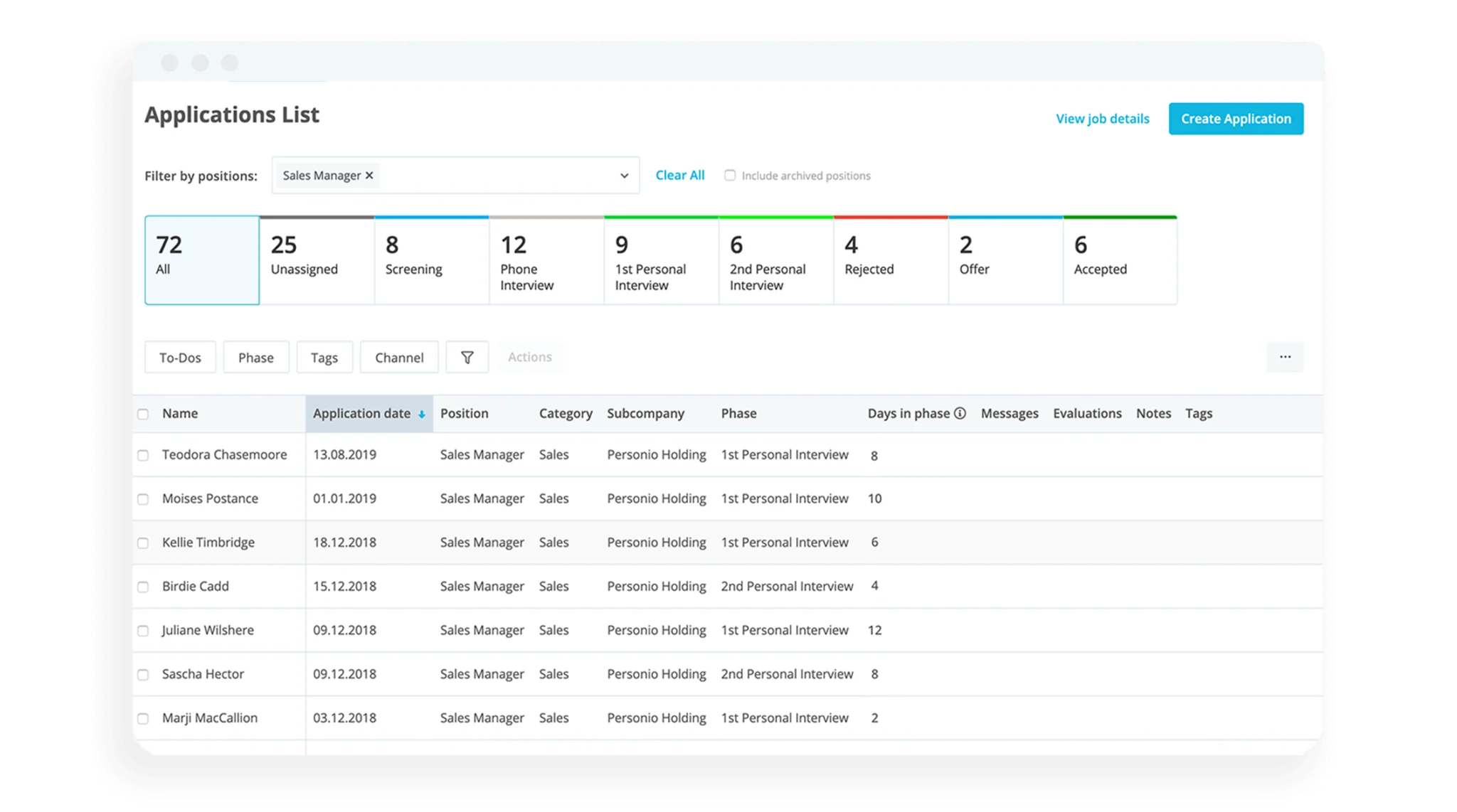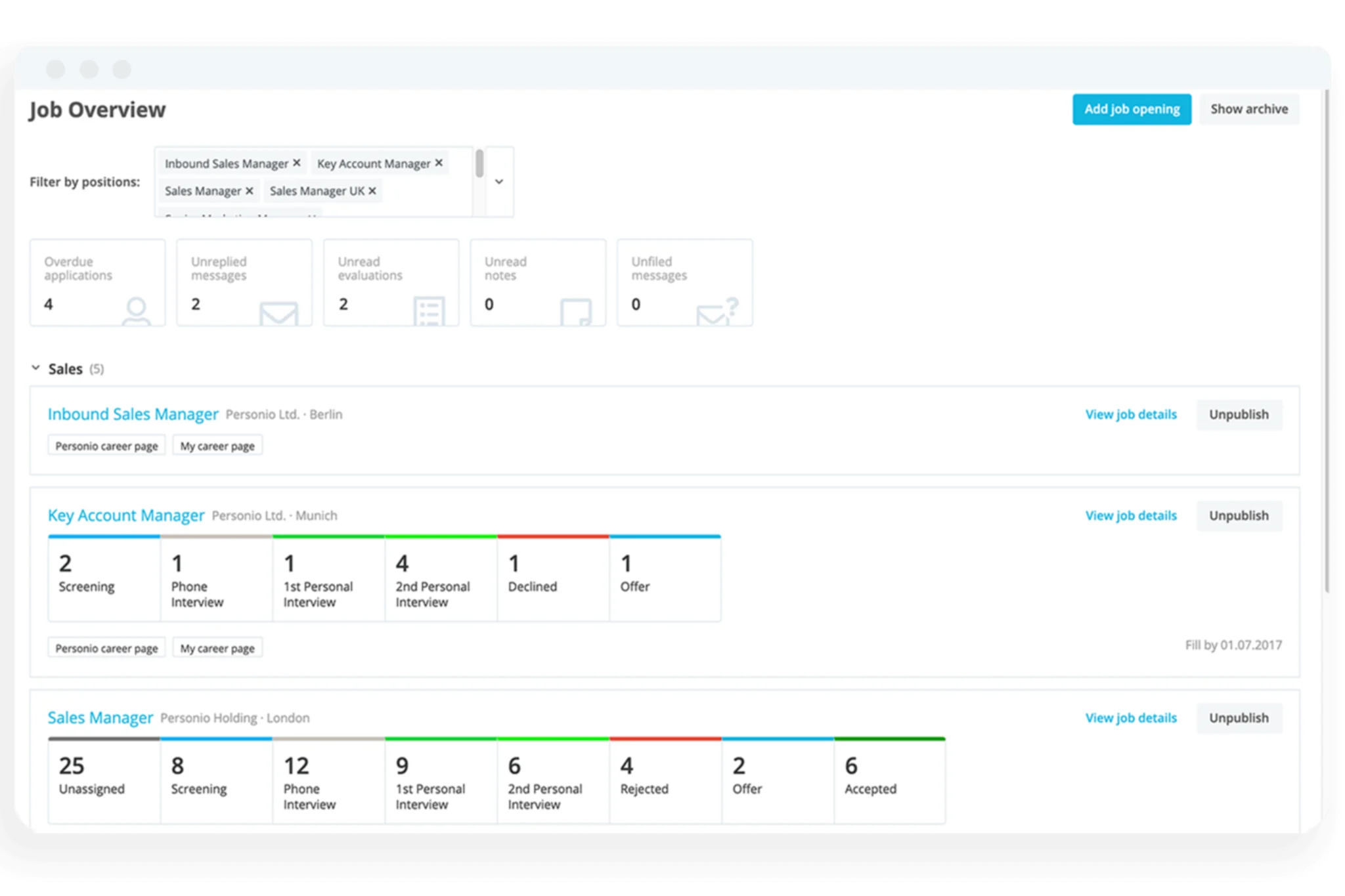The 11 Advantages of Internal Recruitment

Is the main advantage of internal recruitment saving time and money? It can be, but it’s deeper than that. In this article, we outline the advantages of internal recruitment, while acknowledging the disadvantages, to offer a fully-rounded perspective on the subject. Let’s talk about all things internal recruitment today.
Take the stress out of recruiting top talent with Personio today.What is Internal Recruitment?
Internal recruitment is the process of filling job vacancies within a company by exclusively considering current employees. It involves advertising positions internally and leveraging existing talent from different teams and departments to address skills gaps and promote career growth.
What Are The Main Advantages of Internal Recruitment?
The main advantage of internal recruitment is that it can save time and money, but it can also serve as a way to develop and motivate employees within your organisation.
Let’s start by taking a step back. When a company is hiring someone for a new role, there are two potential approaches:
Advertise the job externally and invite applications from multiple sources.
Only advertise the job internally to current employees in the organisation.
Some companies may even do a little bit of both. They may advertise a position internally, or they may even be required to in some institutions, before taking it externally. In any event, internal recruitment should almost always play a role in the overall recruiting process (even if it’s more of a footnote than a focal point).
We outlined the entire internal recruitment process in this article.
Would Internal Recruitment Benefit Your Company?
The world is full of great candidates. But, as anyone with high employment standards has likely experienced, finding these candidates is not always easy. As we describe in our complete guide to recruitment, there are at least six phases of the recruitment process (from advertising a job to signing the contract).
Going through each of these to find your ideal candidate can often be:
Long with multiple steps
Painful or stressful
Time-consuming with so much to do
One of the key advantages of internal recruitment is eliminating these aforementioned pain points.
Recruiting candidates internally often saves money in the short term. That’s because you can hire someone you know, like and trust, you don’t have to pay the external recruitment/finders fees or advertising fees.
What Does UK Law Say About Internal Recruitment?
The advantages of internal recruitment also come with their own legal considerations. In the UK, there are some legal concerns we need to address. By no means is this list exclusive, so be sure to consult any legal advisers you deem necessary to ensure you are fully compliant with relevant legislation.
1. Discrimination
Be aware of any potential actions and make sure that the recruitment and selection process is monitored to ensure that there is no discriminatory treatment. According to Croner-i, this is a duty for public authorities under the Equality Act 2010. And while experthr says that there is no specific legal requirement for employers to advertise every job vacancy that arises, be prepared to demonstrate that there was no unlawful discrimination that took place – intentionally or inadvertently – during the hiring process.
Even how a job is advertised could be perceived by some people to be biased. For example, if jobs are shared using personal networks or social media, some people may not hear about a job until it’s too late to apply. Expert HR explains that “Candidates [who] have been sought through an informal recruitment exercise may be able to claim discrimination on the basis that the recruitment method was a discriminatory arrangement.” It sounds crazy, but rather err on the side of caution. Even if it’s only an internal role, make sure that the job is advertised as widely as possible across the company.
2. The Right to Work in the UK
Make sure your employees have the right to work in the UK. In the case of existing employees this is usually less of an issue – but be sure to check any immigration-related documentation in case a change of job might violate the conditions of their ability to live and work in the country.
The Pros and Cons of Internal Recruitment
The advantages of internal recruitment also come with their own disadvantages. Here are some you should keep in mind:
Pros of Recruiting Internal Candidates | Cons of Internal Recruitment |
|---|---|
You already know what you’re going to get (mostly). | People’s attitudes and behaviour might change when recruited for another internal role. |
Smaller learning curve, so they can get up and running more quickly. | Because applicants assume they know things, they may miss out on asking important questions that someone from outside might ask. |
Familiarity with processes, procedures and organisational behaviours. | Missed opportunities to bring in external perspectives on how things can be done better. |
They can potentially start the new role more quickly than an outsider (no notice periods). | Moving someone internally leaves a gap that must then be filled, so you may still need to pay advertising & agency fees to backfill the now empty role. |
The recruitment / management team is often familiar with their work. | Just because they’re good at what they do now, that doesn’t necessarily mean they’ll be great at the next role. |
Internal candidates can use relevant examples of work within the company to showcase their strengths. | Bias might prejudice internal recruiters for / against internal candidates. |
Gives potential leaders the chance to show what they’re capable of. | Promoting from within may mean people don’t respect them – especially if they jump up several levels. |
It shows your company‘s commitment to growing people. | People who applied, but didn’t get the job, might need extra reassurance or other opportunities to prove themselves. |
Might be cheaper to promote someone internally. | Might create resentment with other team members who didn’t get the job. |
Makes the whole admin process much simpler. | Might be limiting your options by not considering external candidates. |
No costs for advertising & agency fees etc. | If you can’t find someone internally, employees might feel like they’re not good enough. |
| Additional training might be required to raise internal candidates to the required skill level. |
Best Practice: Take the Stress Out of Recruitment
Your company should consider internal recruitment as an arrow in your organisational quiver. Used when the time is right, but avoided when it would otherwise be unnecessary. Saving time and money helps, but it shouldn’t be the deciding factor.
Instead, your team should be thinking of ways to slow down cumbersome recruitment processes to speed up your hiring velocity. Internal recruitment may be attractive because it’s simple, but external recruitment can be just as easy.
First, let’s break down how an HR system offers an advantage to internal recruitment:
Take a peek at your org chart to see where employees currently stand.
With a digital employee file, you can review an employee’s work history.
Alongside a performance function, you can see how they have performed and progressed.
However, be aware that all candidates must be judged on an equal footing so don’t include or exclude information that may be prejudiced towards or against any specific candidates.
Internal Versus External Recruitment Processes
Let’s quickly illustrate the steps you may need to take, and the ones you can avoid, by employing either an internal or external recruiting process…
Recruitment Process You Can Avoid When Recruiting Candidates Internally | Recruitment Processes You Should Still Go Through |
|---|---|
Candidate sourcing (although jobs must still be advertised). | Confirm the new job is required and what its roles, responsibilities and salary are. |
CV, background, and ‘right to work’ checks (as these have already been done). | Have a job description/person specification. |
A detailed application process (you can do a streamlined version instead). | Ensure there is a clear, fair application process. |
You might not require candidates to submit a CV or need to review these. | You might still choose to ask candidates to prepare tasks or undertake tests, if this is appropriate for the role. |
| Interview candidates. |
| Evaluate and select candidates. |
| Make a job offer and get them to sign a new contract. |
| Send out job rejection letters or arrange follow-up meetings to inform candidates who didn’t get the job. |
| Inform HMRC so that tax information is updated. |
If you need any help with hiring – internally or externally – an HR software like Personio can help. Book a demo today to speak with an expert about how it can expertly address your HR function’s top challenges.


